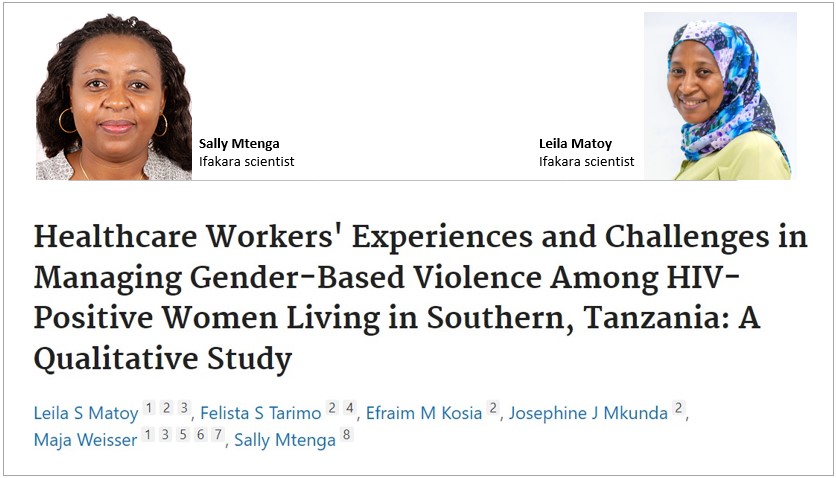
GENDER: Equipping healthcare workers to respond to violence

In semi-rural Tanzania, healthcare workers (HCWs) face significant challenges when it comes to screening and managing gender-based violence (GBV) cases among women living with HIV, a new study has found.
The study, published recently on the HIV AIDS (Auckl) journal, aimed to explore HCW’S perceptions and experience regarding this issue in Southern Tanzania.
It was conducted by scientists from Ifakara Health Institute led by Leila Matoy with contributions from Felista Tarimo, Maja Weisser and Sally Mtenga. Efraim Kosia and Josephine Mkunda from The Nelson Mandela, African Institution of Science and Technology (NM-AIST) also contributed.
Identified challenges in managing GBV
The research team identified that HCWs lack adequate training to effectively identify and manage GBV among women living with HIV. This gap in knowledge leads to uncertainty in reporting violence and providing appropriate support.
Resource limitations, including insufficient screening tools and guidelines, high patient volumes, and a lack of a clear referral system, further hinder effective GBV screening and support efforts. These challenges leave HCWs feeling ill-equipped to assist survivors.
Recommendations for improved services
To address these challenges, Ifakara scientists recommend strengthening HCWs’ capacity through implementation of comprehensive training programs to enhance HCWs' skills in GBV identification and management. Additionally, allocating resources and ensuring healthcare facilities have adequate screening tools and guidelines to support GBV survivors along with establishing efficient referral systems are also vital steps in streamlining GBV detection, facilitating timely access to appropriate support services for survivors.
Designating specific HCWs to manage GBV cases and conducting community awareness campaigns about GBV and available support services are essential steps towards creating a more responsive healthcare environment in semi-rural Tanzania.
These initiatives aim to create a more responsive healthcare environment in semi-rural Tanzania, addressing the complex challenges faced by women living with HIV affected by GBV and ensuring they receive the necessary care and support within their communities.
Societal perceptions and challenges
The study also highlights societal perceptions that discourage GBV reporting, such as viewing violence as a normal part of life and fear of social and economic consequences.
Addressing these barriers requires empowering women with information about GBV and available support services, aiming to shift societal norms and reduce stigma, noted the scientists.
“In this study, HCWs reported that women are afraid to disclose their experiences of GBV due to fear of social and economic consequences, feelings of shame, and stigma. However, women may disclose their experiences over time and when they feel ready and comfortable with their HCW’s. Yet, HCWs do not have enough time as they are over loaded with other responsibilities at the clinic.”
“These results indicate the necessity of empowering women with knowledge about GBV, available support services in the community and GBV impact to them, children and community as well as economic empowerment.”
Addressing context-specific challenges is crucial
The study also underscores the importance of addressing context-specific challenges to ensure that healthcare workers can deliver optimal services to vulnerable populations. By empowering HCWs and improving systems, the scientist believe that better support can be provided to women living with HIV who experience GBV.
Read the publication here.
